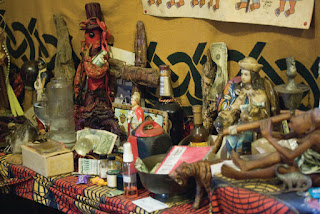Religion Watch
Volume 36 No. 8
Attacks against Afro-Brazilian religious groups led by evangelical Christians in Brazil have increased in recent years, causing human rights watchdog groups and activists to press for a “terrorist” designation for such perpetrators, writes Danielle Boaz of the University of North Carolina in the online Journal of Religion & Society (Vol. 23). Boaz writes that these patterns of attacks are largely carried out by evangelicals targeting the rituals and places of worship of such Afro-Brazilian religions as macumba and Candomblé, viewing themselves as engaged in “spiritual warfare” against sorcery and Satanism. Most recently, such assaults have been carried out by gangs of drug traffickers who have converted to evangelical churches, with a series of attacks in the Rio de Janeiro area where the gang members threatened and/or ordered the closure of 100 Afro-Brazilian temples, destroyed religious artifacts, and threatened priests with death while beating and holding devotees at gunpoint, often videotaping the incidents. Boaz adds that evangelical drug traffickers are only one segment of these “evangelical extremists,” and that these incidents are taking place in different regions of Brazil. There is now government documentation that these attacks are coming from those with evangelical backgrounds.
The hotline Disque 100, established in 2011 to record such incidents, has registered 2,862 reports from victims and witnesses of religious intolerance in the last eight years; 82 percent of the cases have occurred from 2015 to 2018. Devotees of Afro-Brazilian religions represented, on average, 50 percent of the victims in cases when their religions were known, and from 2016 to 2018, they represented 64 percent—although Afro-Brazilian faiths combined comprise less than one percent of the population. Protestants, representing 22 percent of the population, comprised 62 percent of the aggressors’ religions, when these faiths were known. In November of 2019, the International Commission to Combat Religious Racism released a report analyzing 300 cases of intolerance against Afro-Brazilian religions that took place between 2000 and 2019. In cases where the aggressors’ religion was known, 100 percent were Christian, with related documentation showing that 80 percent were evangelical. Boaz writes that the government is aware of this pattern of violence, as are such international monitors as the International Religious Freedom Report of the U.S. State Department, but they refrain from designating extremist evangelicals as domestic terrorists, even with the recent introduction of anti-terrorism legislation. Along with other activists, Boaz argues that with evangelicals representing an increasing percentage of the population, including policymakers and even President Jair Bolsonaro, there is a reluctance to consider some of their fellow believers as terrorists “because they are neither a foreign or ‘exotic’ threat.”
(Journal of Religion & Society, http://moses.creighton.edu/JRS/)
https://www.religionwatch.com/evangelical-extremists-a-terror-threat-in-brazil/


No comments:
Post a Comment